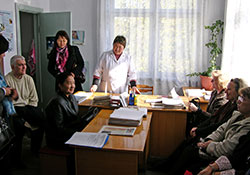Evaluation of key elements of national tuberculosis control programme in Kyrgyzstan

WHO/Andreas Lemcke
Upon request of the Minister of Health of Kyrgyzstan, the WHO Regional Office for Europe conducted a series of country visits to evaluate key elements of the national tuberculosis control programme. The aspects evaluated included the use of rapid molecular diagnostics for tuberculosis, tuberculosis surveillance, TB and multidrug- and extensively drug-resistant TB (M/XDR-TB) treatment and care, and governance and management of the national TB control programme. The various aspects of the TB programme were evaluated in three consecutive country missions in December 2012 to January 2013.
Technical reports, surveillance data, national reports, relevant public health and epidemiologic data were reviewed. WHO experts interviewed chief TB doctors, health care staff, and personnel of SES, policlinics, TB laboratory services, and key national and international agencies involved in TB control in the country. The evaluation team visited field sites, the national TB center, the national reference laboratory, and several TB and general health care facilities.
At the end of the mission the Minister of Health was debriefed on the findings and recommendations of the evaluation missions. The Ministry of Health of Kyrgyzstan is determined to address the challenges and improve the national TB control programme. The WHO Regional Office is working with the Ministry of Health and other partners and donors to intensify technical support to the country.



